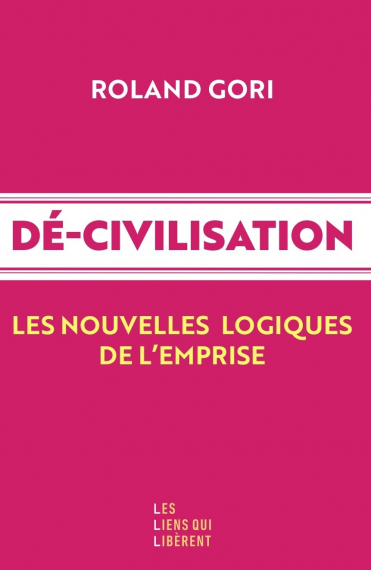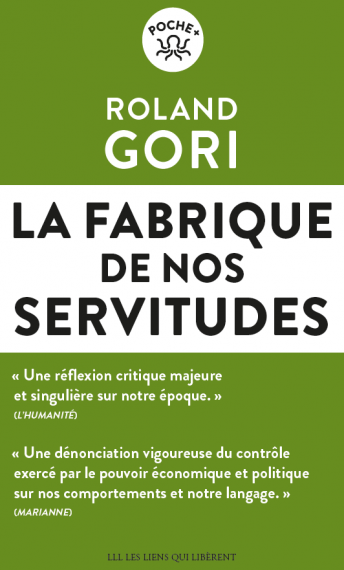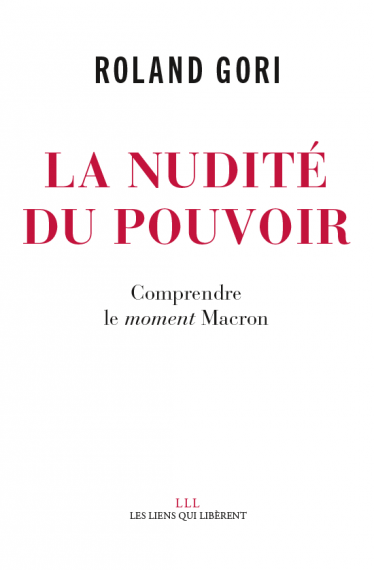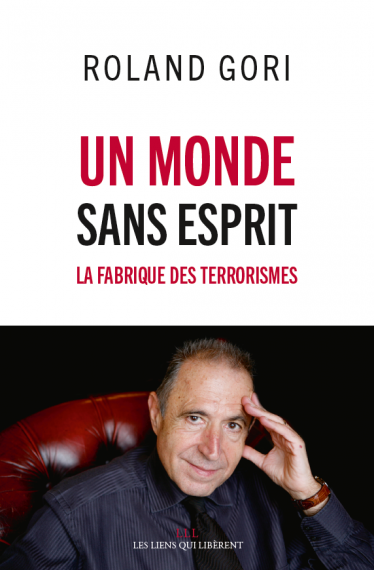Soutenez l'Appel des Appels
- De quoi la « dé-civilisation » est-elle le nom ? Un éloge réparateur et humaniste de la création envisagée en tant que lutte sociale et politique pour l’émancipation des êtres humains.
- Dans nos sociétés de contrôle, l’information est le moyen privilégié de surveiller, de normaliser et de donner des ordres. Les informations, molécules de la vie sociale, deviennent les sujets de...
- Il fallait à notre pays un certain culot pour élire à la magistrature suprême un jeune homme quasiment inconnu, négociateur habile du compromis autant que «traître» méthodique. Emmanuel Macron...
- Dans le clair-obscur des crises politiques naissent les monstres. Ils naissent du vide culturel d’un monde politique sans esprit, d’un monde où les techniques sont devenues folles, d’un monde qui...
Philippe-Joseph Salazar (2012): Rituels de complicité dans les procédures d’évaluation en Afrique du Sud. Althusser à la rescousse.
Si l'évaluation est un problème politique, en France et en Europe, il en est de même dans d’autres pays qui singent la méthode et parfois la raffinent dans des directions nouvelles. En Afrique du Sud une récente initiative impulsée par le gouvernement pour créer des “chaires nationales”, payées directement par l’Etat, à côté des chaires universitaires traditionnelles (les universités publiques sont indépendantes de l’Etat dans ce pays), et “alignées” sur différents plans de développement techniques et industriels, a provoqué une vive polémique à la fois sur le fond (est-ce le rôle d’un gouvernement de créer des chaires?) et sur la méthode d’évaluation (confiée à la National Research Foundation, ou NRF, l’équivalent de l’ANR avec une dose de CNRS). Philippe-Joseph Salazar, actuellement titulaire de la chaire de rhétorique à l’Université du Cap, et qui dirige plusieurs projets en rhétorique et démocratie financés par la NRF, vient de publier dans la revue Social Dynamics (aux côtés d’un autre article, sur le même sujet, par Achille Mbembe) une analyse documentée de la méthode imposée pour la mise au point des dossiers de candidature, par quoi il démontre comment la combinaison de critères dits “narratifs” avec un empilement de contraintes statistiques et proprement “rhétoriques”, soutenue par une ambiguité éthique sur “qui peut écrire quoi”, et le refus par la NRF de produire un “feedback” tant sur la procédure que sur la gestion des dossiers, résultent dans la mise en place d’un appareil idéologique d’Etat. Et comment cet appareil est un système objectif de complicité.
L’analyse se fonde sur des documents précis et des références précises aux méthodes et aux critères.
Salazar conclut en démontrant qu’un élément clef du système mis en place par l’Etat et accepté sans critique par les universités qui, ayant toutefois le pouvoir de dire non, à la fois craignent d’être accusées d’être “anti-nationales” et accueillent avec joie cette pratique gestionnaire, est l’acceptation par les disciplines non-scientifiques de s’être laissées amalgamer sous la bannière des “Humanities”, une catégorie perverse qui légitime l’appareil idéologique, en suscitant, outre les procédures d’évaluation en amont et les techniques de gestion en aval, des structures de contrôle et de jugement (les commissions) qui échappent aux universités.
Voir: Philippe-Joseph Salazar (2012): Rituals of complicity, the ‘humanities’ rhetoric,
and the closing of the South African mind, Social Dynamics: A journal of African studies, 38:1,
48-54
Lien permament: http://dx.doi.org/10.1080/02533952.2012.699245
Intégralité de l'article ci-dessous.
Rituals of complicity, the ‘humanities’ rhetoric, and the closing of the South African mind, Social Dynamics Vol. 38, No. 1, 2012, 48–54
(ID: 699245 DOI:10.1080/02533952.2012.699245)
This is a preprint of an article submitted for consideration in Social Dynamics, 2012, Taylor & Francis; Social Dynamics is available online at: http://www.tandfonline.com/doi/abs/10.1080/02533952.2012.699245
Rituals of complicity, the ‘humanities’ rhetoric, and the closing of the South African mind
Philippe-Joseph Salazar*
Centre for Rhetoric Studies, University of Cape Town
“Knowledge. Noun. The facts, feelings or experiences known by a person or group of people”, as we were told. (DST Ten-Year Plan for Science and Technology). Against it, read Marx, XIth thesis on Feuerbach.
1. There is a muted controversy regarding the ‘humanities’ in the context of the SA Research Chairs Initiative (SARChI) that signals a closing of the South African mind – no one cares about it in the general public. Indeed the country is slowly but surely slipping back into two traditional patterns of deference to authority: on the one hand, we suffer a return to ‘pastoral governance’, rooted in imagined, rural traditions often shaped by the apartheid regime and now reclaimed by post-modern politicians in defense of irrational behaviours; on the other hand, we endure a renaissance of a ‘boom town’ mentality straight out of the glorious era of the gold and diamond rush. In both instances, what matters in this dual ‘return of the repressed’ – the pastoral and the capitalist – is precisely ‘matter’, that is land, things, objects, yet nowadays bathed in the anaesthesia of silly consumerism, comforted by the insipid materialism of popular culture and vouchsafed by the acquisitive ethos of the new oligarchy. This phenomenon is rapidly consigning to the dustbins of our history the last remains of our long and rich and contrasted intellectual tradition and ethical care for the inner self, whether indigenous or colonial, a compact that truly made this country stand apart on a continent otherwise subdued, alienated or incapacitated.
2. However rhetoric teaches us that a controversy, when it deals with matters of opinion, is unlikely to resolve anything tangible unless we try to deal first with facts. Let me then begin where it all began, the controversy surrounding the SARChI affair.
I would like to review a few basic facts of the controversy and, specifically, of Phase 1 of the chairs allocation (in Phase 2 successful proposers will have to submit fuller proposals, whereupon universities will propose actual names to fill the chairs – so goes, for now, the official storytelling).
First fact: universities that set up procedures to screen and prioritize applications have not yet received any ‘feedback’ from the ministry, and it is likely to take many months before that happens; if it does and is not perfunctory. In the meantime the reason for rejections have to be worked out by the victims themselves, although it is rumoured some have received ‘feedbacks’, while others clearly have not. To keep people guessing and to set up differences of treatment is a traditional way of asserting power. ‘Think of what you did wrong’ is nonetheless the implicit message of the bureaucracy’s inability to provide, readily, a consistent, fair-handed and systematic procedure of feedback. Conversely successful proposals should be made public so that, by negative analysis, rejected proposers, who have not received a detailed feedback, would see ‘why others did well’. In this case the bureaucracy cannot even hide behind a lack of resources, the usual excuse: the applications are done, electronically, just migrate them to open access on the NRF website. So, we do not know why ‘these’ were kept and ‘those’ rejected. It is even tricky to get an exact list of the accepted proposals. We have then to accept the ritualistic, general explanation given by the minister. Surely it would be simpler to release the minutes of positive decisions for a mere 60 chairs than to cut and paste together the reasons for rejection of a couple of hundreds.
Second fact: we do not have a clear understanding of the procedures followed by the various universities in screening proposals; they probably range from peer-review to insider trading or simple bricolage. It means that, within institutions, at least those I know, proposers, presumably all top scholars who were in competition are ignorant of what was decided by whom and how. There is an omertà, and like any omertà it consists in trying to avoid conflicts within the family by adhering to a code of behaviour while, in my view, it would be far more responsible for committees of Faculties, for instance, to lay bare what happened.
Third fact: we do not have official statements from universities regarding the value they attach to those failed proposals they themselves retained and recommended to the ministry. Plainly the argument is that if a field is deemed innovative and excellent enough to be put forward to the ministry for tax-payers’ funding, it should be good enough for its home university to raise funds from other sources. Some institutions, I am told, have provided reparation, yet unless these measures for compensation are made public, and their rationale argued publicly, it is possibly yet another layer of obfuscation added to the whole process – institutions behaving no better than the ministry.
Last fact: we have only an anecdotic knowledge of the committees or panels that gave advice or sat in judgement after proposals were received by the ministry; the NRF site now provides lists of names, yet without any explanation on the academic standing of their members or reasons for their membership. Whether Parliament was part of the process through its dedicated Portfolio committee is not mentioned, as far as I know. Should we expect an outside evaluation of the panels’ or committees’ work since, sitting in judgement, they recommended the allocation of 60 chairs at taxpayers’ expense? Nor do we know if the minister actually read all proposals or delegated the summarising task to her Director General or a lowly Deputy Director General. In fact, unless questions are asked in Parliament by the Opposition, and presumably answered adequately and timeously by the minister, that is before Phase 2 is far too advanced, we may never have any details, except political, ceremonial statements while universities who bagged some chairs will sit tight in fear that, when they put actual names forward to fill the chairs, the minister says ‘no’ for this or that reason. Or none.
In sum we lack basic or consistent or rational information on arguments for rejection, arguments for acceptance, arguments for justification and arguments for appeal and for pursuit. We know nothing substantial, merely that some universities were ‘lucky’ and others not. Fortune indeed wears a blindfold. There is a word for it, of course: the power of the arbitrary, couched in rituals of submission, grandiloquence and command.
What I have described is the first mechanism of an Ideological State Apparatus: keeping people in rituals of recognition while appealing to them as individuals whose opinion matters to those who perform the ‘interpellation’ as Althusser says (the aptly named ‘call’ for applications).
I realise this is the kind of fancy statement the ministry would welcome as further proof that we, in the ‘humanities’, do not deserve really any chairs. To unravel this Althusserian statement, I have to go back to my rhetorical base, as it were, that is to the argumentative bases upon which applications had to be made. As I tell my graduates in rhetoric: always assemble the facts of ‘invention’ first, do not jump the gun – in this case the fabrication of applications, and what they reveal about further features of this Ideological State Apparatus called SARChI.
3. There were a number of documents applicants who ‘drove’ Phase 1 proposals had to read, in spite of some confusion, fed by the NRF, on what to read ‘really’ and what version of what document was ‘really’ important. The rule of bureaucratic rhetoric is to impose circulars suddenly, to prevent face-to-face interaction, and constantly to unsettle recipients by sending new circulars that are slightly different documents, thus precipitating panic and expectation of more changes.
What were these documents? The DST Ten-Year Plan for Science and Technology, 42 pages, which opens with this thundering clap: ‘Knowledge. Noun. the facts, feelings or experiences known by a person or group of people’; South Africa’s National Research and Development Strategy, 81 pages; the Human Resource Development Strategy, 62 pages; the NRF Guide for Application, 23 pages; in addition to which the mercifully terser and better-written universities’ own Research Strategy policies (those I saw, at least). There were other documents emanating from the national bureaucracy, but those mentioned are the key ones.
The objective aim of this battery of documents was of course to terrorise and deter applicants and to have colleagues who wished to drive proposals self-eliminate when they realised, at short notice, they were faced with a Kafkaesque task of absorbing imperious and flatulent prose that left no room for a true argument. If one managed however to read them, to summarise them as I know one colleague did, and to repress the nausea any ‘leading researcher’ would feel at reading such ‘stuff’, in sum and in serious terms if one was able to correlate anti-intellectual or uncritical arguments made by the documents, cut and pasted from a variety of sources, with intellectual and critical arguments, ours, the next step was then to try and squeeze one’s argument into the very limited amount of pages the bureaucrats can bear to read. That was the second deterrent.
Indeed, written proposals had to fit in a template comprised of three broad sections, one ‘intellectual’, the other managerial, plus a rump of stats. Surely, one would think, the intellectual argument should be prominent. In reality strict limits were placed on the length of core arguments (although, I believe, this constraint was waived on an arbitrary, ad hoc basis, which only making public the successful proposals would reveal, or gainsay: who was given leeway?). The intellectual argument had to be inserted in two blocks : in the first, ‘briefly describe’ the ‘alignment’ of the proposal with the documents mentioned; in the second do the same with regard to the new chair’s ‘alignment’ with existing research at the home institution. Length? Four pages maximum each Arial 11 pt, 1.5 line spacing or, in my estimate, 2,000 words maximum each, at a squeeze. Quantity imposed itself upon quality.
An interesting, rhetorical device was also recommended: to use a narrative form. Applicants, I believe, were told to arrange arguments (already reduced to triteness by the lack of space) into ‘narratives’ as if storytelling was the most adequate way in which scholars of ‘knowledge and innovation’ can explain what they do. Rhetorically, means of persuasion developed by fields of research that, rightly, believe they are contributing to ‘humanity’, necessitating sharp instruments and a precise vocabulary that distinguish them from popular knowledge, had to be dumbed down to the popular common, argumentative pattern of the ‘breaking news’ set as a quick story.
The ponderous rest of a proposal was made of short sections on numerous management aspects, followed by a morass of tabulated stats on student enrolment and publications, the latter rolled out under a revealing mist of uncertainty: should the proposer be ‘honest’ and list only students and publications that truly were linked to the proposal, or play a latitudinarian, advertising game of listing all that ‘relates’ to it. I am told devices for honesty varied. Unless successful proposals are made public and claims tested, we will never know what sort of impact those tabulations, and the evidence of value they impressed on who ever sat in judgment at ministerial level, actually produced. Let alone if they were truthful, which is not that important as the process is in essence amoral: what matters is the persuasive correlation between the presentation of stats and the desired effect, how fallacy creates credibility.
This rhetorical construction (massive documents/restricted arguments; diminutive proposal/inflated statistics; narrative/specifics; stats/facts) had for effect to leave the interpretation of the mandatory correlation between the documents imposed and the arguments proposed to those who framed the documents, by denying proposers the same space to develop an argument. It reminds me of Stalinist trials, where the prosecution, stating the case for the State (as the documents do here: they state the case for a State of research), was given hours; and the accused two minutes, ‘and now be quiet’.
As a rhetorician I always tell my graduates that to reach out to audiences and get them to ‘truth’, fallacies are necessary to accommodate prejudices. But the rhetorical manoeuvre I have just described, having to change radically one’s uses of argument, and even using fallacies to drive one’s point home, has a name: subjection. This is, in fact, what Althusser describes as another key feature of any Ideological State Apparatus: subjection to a higher agent, here the circular claim that The People Whom the Documents Represent Do Not Need Complicated Stories.
These were the rhetorical moves necessary to make an argument for an application. Two mechanisms of the Ideological State Apparatus called SARChI are now in place. Let me now outline the third: ‘illusion’.
4. At this stage in applying, there was no turning back: once you accepted the rules of the game, and seized up what playing the game entailed, you were part of the game. My point here is not to heap derision or Schadenfreude on unlucky applicants and give ironical satisfaction to the lucky ones, but to point out to the former that by engaging at all with the procedure and the game they performed one essential task the apparatus of SARChI intended them to perform: that leading scholars who drove applications gave legitimacy to the ministerial game and in fine, to applications by lesser scholars, as at face value they, by and large, will be nominated to fill the chairs (on that count, try and do a tally of A1-rated scholars in relation to Chairs, or ask yourself why our most prominent historian is not a SA chair). By gaming, you join a concelebrating of the bureaucratic value of the NRF, the political value of the minister, and the academic value of those who will be nominated. You have been objectified in a world of make-believe, of illusions.
A proposer who had not fully understood this ‘epidictic’ entrapment, as we call it in rhetoric, is not deserving of any pity: vanity deserves its own bonfire. Similarly whoever was aware of the apparatus and yet accepting of its consequences has no right to complain. Unless, of course, the ultimate motivation was an ironical gesture or in the spirit of a sporting challenge.
I mentioned vanity. Indeed vanity is a powerful motor, fuelled by confusion on the actual value of the chairs – financial value with the lure of salaries above scale; and status value, under the illusion that the chairs would be akin to chairs of excellence. On this last count their growing numerosity has in fact already depreciated them. They are not exceptional but ordinary. Yet they are marketed as exceptional, for exceptional people, and for exceptional research. Vanity brings up the question of ‘illusion’ in academia’s relation to power.
Readers of Bourdieu would have recognised his concept of social ‘illusion’ by which institutions play with subalterns’ wish to reproduce signs of distinction of those whose capital, material or immaterial, they see as creative of power. Althusser calls it the rule of imagination. The SARChI ‘illusion’ is that an SA chair will provide a recipient with signs of recognition and signs of excellence.
This game, or ‘illusion’, of appearances to be kept at all costs (including the position of NRF and the ministry’s role in shaping policies) is neatly encapsulated in a fact, hardly noted in this controversy, that Phase 1 applications could not be personalised. A pretense had to kept, upfront, that no application was predetermined by a wish to appoint anyone in particular. Given the narrow field of critical or novel or cutting-edge research in the ‘humanities’ in this country the pretence must have been difficult to maintain, but appearances, like phenomena, had to be saved so that the process of bureaucratic legitimacy be also saved. This led, I am sure, to interesting, argumentative contortions in some proposals. A derivative, perverse product of this game of recognition is for all to see: by writing a proposal, by being recommended, and by failing, smart scholars in search of promotion fabricated arguments of added-value that were placed on the record (honorable failure at outsiders’ hands can be turned argumentatively into collegial, insiders’ acknowledgment).
The game set in motion is a perversion of the scholarly mind; or perhaps it trains a sharp and crude light on the real mechanisms of scholarly games.
5. Now, leaving the rules of the SARChI game and the moves of the game alone, how does the game described itself?
Let us look at the documents. The ‘humanities’ are not mentioned anywhere. I found one quote, lifted from a UN declaration, on the centrality of ‘the human’, and that is quaint enough (it shows the ‘alignment’ of the documents with a higher document that acts as a guarantee, above all suspicion – ‘guarantee’ is the fourth feature of an Ideological State Apparatus). There are some strategic indications on the need for ‘quality education’, a verbal device since the ruling commonplace in the documents is ‘skilling’, not education (I suspect ‘education’ was added for reasons of politicking). But one is at pains to find in the documents against which the proposals had to test their arguments, and presumably were tested, any intelligent or intelligible demand for a supply called the ‘humanities’. In fact, unless I am mistaken, there is none. This is not and never was intended to be a ‘humanities’ game. At best, a game for ‘educationalists’, gathering crumbs fallen from high table (again, to satisfy the handling of the dossier by this specific ministry and not, as it should have been, by a national commission of experts set up for this purpose and accountable to Parliament, after a due process of consultation).
Here is the argumentative gist of the apparatus called SARChI, the one which defines what the game is all about:
In particular, the programme is aimed at increasing scientific research capacity through the development of human capacity and stimulating the generation of new knowledge. It is also intended to support the realisation of South Africa’s transformation into a knowledge economy in which the generation of knowledge translates into socio-economic benefits. (Guide, p. 4)
What is meant by ‘knowledge’ is
to produce a greater number of highly skilled individuals; particularly in SET (science and technology), to achieve the goal of ‘an equitable, sustainable, and inclusive growth path that brings decent work and sustainable livelihoods, education, health, safe and secure communities, and rural development’ (Guide, p. 4)
In the absence of reports on how proposals from ‘the humanities’ (leaving aside Education) were assessed, positively (one, two?) and negatively (dozens?), we are left to wonder how a chair in, say, African languages, was allowed to play the game, unless through some admirable retooling of its own practice – we would need to see the proposal and the report, from which we should learn something on the nature of ‘illusion’ and the game played with us by the state apparatus.
However the blame shall not rest with those who have conceptualised the game or the gamers who managed to score, but on ourselves.
6. We, in the ‘humanities’, have gone into this game under false pretences. The banner under which we have been congregated is the telling sign of our own illusion. It is perhaps time to question whether that catch-all expression that emerged a few years ago, the ‘humanities’, is not the cause of our own demise.
Although I have been a professor in Humane Letters, I have no instinctual liking for the idiom ‘humanities’. Created as a rhetorical tool to salvage the less practical side of social sciences from their loss of prestige and to help the managerial reorganisation of universities by clumping together ‘all that did not make money’, the ‘humanities’ have become a totem in some circles. Like a totem the word itself is supposed to protect the tribe, to mark its territory, and to ward off enemies. In the current controversy we are asked to rally around our totem, to designate the enemy (the NRF and the minister), and to defend our territory. I have no sympathy for that sort of behaviour. It is an ‘idiotic’ behaviour in the strict sense of the word ‘idiot’, and of its ancient Greek ethnological concept: it refers to an ‘idiom’ that only those who practice it understand and respect, a close and terrified idiom that turns its speakers into precisely ‘idiots’. It is about time we step outside this idiocy, in itself a fundamentally idealist position, that we shed totemic behaviours, that we get rid of the automated defence of the ‘humanities’. For what are we blameworthy? For many a failure.
We failed to assert the value of the Liberal Arts. We failed to argue for a differential between the performing arts and the creative arts. We failed to resist the assimilation of field-based, intervention-based social sciences with those that take the theoretical long view.
We have accepted uncritically the notion of multi-inter-cross-trans disciplinarity, which served us well as an intellectual guerrilla tool against apartheid’s intellectual hegemony: today, these notions may please the nostalgic mind but they add to the outside perception that we are dealing with soft notions clad in obscurity to hide their inner weakness – ‘gender’ can still safely resort to this old tactic, through ‘shaming’ of its opposition. For how long, I wonder.
We have failed our colleagues in philosophy by letting them be instrumentalised. We have failed the ‘languages’ by not opposing their commodification. We have failed our creative writers by what a Nobel Prizewinner called, by implication, a lack of generosity. We have failed our colleagues in the less technical aspects of the Law by slowly but surely letting the ‘humanities’ creep over them.
We failed to challenge the nomenclature of ‘fields’ and made-up panels used by the NRF. We failed to express what we thought of the startling definition of ‘knowledge’ trumpeted on the front cover of the DST masterplan, and quoted at the start of this essay.
In sum, we have been complicit in an intellectual state-driven economy of scale by accepting to cluster under that slogan, the ‘humanities’, critical forms of knowledge that should have remained discrete. We have failed to develop our own game.
Clearly the slogan the ‘humanities’, like a totem, has presence and appeal, and its sound has a nice ring to it, but it is a ring that is proving to be a noose. Had we stood our ground, we would now own this ground and the SARChI apparatus would not have been put in place as it is now in place. We may not have been admitted as players in that game, but then the fallacy would have been exposed.
The sooner we reclaim our territories, the sooner we dis-assemble the various apparatuses being set up, apparently, to bolster the ‘humanities’ but, in reality, to ruin the various fields of enquiry, of excellence and of thought, the better placed we will be to have a say that would be neither an illusion nor an act of subservience. By promoting an empty concept, with the generous intention however of promoting ‘immaterial values’, we have failed the academic enterprise. Worse, we are complicit in a far more serious damage than the one done to ourselves: the irreversible closing of the South African mind.
Notes on contributor
Philippe-Joseph Salazar is a former research chair in Rhetoric and Democracy at Collège international de philosophie, in Paris, and currently a Distinguished Professor of Rhetoric at the University of Cape Town. Laureate of the Oppenheimer Fellowship (2008), he is a chronicler for French online medias Le Nouvel Observateur Plus and Les Influences.
* Email: philippe.salazar@uct.ac.za
- A lire sur Mediapart. Après quatre mois de grève, le mouvement étudiant s’est transformé. Avant la rentrée universitaire de la mi-août, ses animateurs veulent mobiliser tout l'été. Et il est de plus en plus question d'élections anticipées...
- Par PIERRE JOLY Psychothérapeute à la Maison Saint-Jacques, Montréal Article paru dans Libération du 11 juin. Les étudiants québécois s’opposent au gouvernement libéral de Jean Charest qui a décrété une hausse de 75% (en cinq ans) des...
Le nouveau monde et la crise des valeurs. Manifeste de soutien aux étudiants et collègues québécois.
Pour les plus anciens d’entre nous, l’insurrection étudiante au Québec réveille de bien vieux souvenirs. Comparaison n’est pas raison. Il n’empêche.
Par Roland Gori, à lire dans Libération
- Par Roland Gori, article paru dans le journal l'humanité du 22 février 2012
- Emission de Catherine Parisot sur Fréquence protestante avec Roland Gori, psychanalyste : "Contre la tyrannie des experts : la liberté de penser"
- On a beaucoup parlé cette semaine d'agences de notation, de dégradation de notes, de crise de l'Europe et ...de gros sous. Mais comment construire un monde différent, comment le penser quand les chiffres et les notations nous imposent leur loi... Une...
Copyright © 2011 L'Appel des appels | Tous droits réservés - Contact





